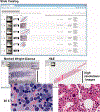The National MDS Natural History Study: design of an integrated data and sample biorepository to promote research studies in myelodysplastic syndromes
- PMID: 31111762
- PMCID: PMC7757428
- DOI: 10.1080/10428194.2019.1616186
The National MDS Natural History Study: design of an integrated data and sample biorepository to promote research studies in myelodysplastic syndromes
Abstract
Myelodysplastic syndromes (MDS), a spectrum of heterogeneous hematopoietic stem cell diseases, vary in clinical severity, response to therapy, and propensity toward progression to acute myeloid leukemia. These are acquired clonal disorders resulting from somatic mutations within the hematopoietic stem or progenitor cell population. Understanding the natural history and the risk of developing leukemia and other adverse outcomes is dependent on access to well-annotated biospecimens linked to robust clinical and molecular data. To facilitate the acquisition and distribution of MDS biospecimens to the wider scientific community and support scientific discovery in this disease, the National MDS Natural History study was initiated by the National Heart, Lung, and Blood Institute (NHLBI) and is being conducted in collaboration with community hospitals and academic medical centers supported by the National Cancer Institute (NCI). The study will recruit up to 2000 MDS patients or overlapping myeloproliferative neoplasms (MDS/MPN) and up to 500 cases of idiopathic cytopenia of undetermined significance (ICUS). The National MDS Natural History Study (NCT02775383) will offer the world's largest disease-focused tissue biobank linked to longitudinal clinical and molecular data in MDS. Here, we report on the study design features and describe the vanguard phase of 200 cases. The study assembles a comprehensive clinical database, quality of life results, laboratory data, histopathology slides and images, genetic information, hematopoietic and germline tissues representing high-quality biospecimens and data from diverse centers across the United States. These resources will be available to the scientific community for investigator-initiated research.
Keywords: Myelodysplastic syndromes; biorepository; natural history; quality of life.
Conflict of interest statement
Potential conflict of interest
Disclosure forms provided by the authors are available with the full text of this article online at
Figures

Comment in
-
Banking on a cooperative effort.Leuk Lymphoma. 2019 Dec;60(13):3102-3103. doi: 10.1080/10428194.2019.1654098. Epub 2019 Aug 21. Leuk Lymphoma. 2019. PMID: 31432734 No abstract available.
References
-
- Jacobs RH, Cornbleet MA, Vardiman JW, et al. Prognostic implications of morphology and karyotype in primary myelodysplastic syndromes. Blood. 1986;67:1765–1772. - PubMed
-
- Kao JM, McMillan A, Greenberg PL. International MDS risk analysis workshop (IMRAW)/IPSS reanalyzed: impact of cytopenias on clinical outcomes in myelodysplastic syndromes. Am J Hematol. 2008;83:765–770. - PubMed
-
- Greenberg P, Anderson J, de Witte T, et al. Problematic WHO reclassification of myelodysplastic syndromes. Members of the International MDS Study Group. J Clin Oncol. 2000;18:3447–3452. - PubMed
-
- Greenberg P, Cox C, LeBeau MM, et al. International scoring system for evaluating prognosis in myelodysplastic syndromes. Blood. 1997;89:2079–2088. - PubMed
-
- Maes B, Meeus P, Michaux L, et al. Application of the International Prognostic Scoring System for myelodysplastic syndromes. Ann Oncol. 1999;10:825–829. - PubMed
Publication types
MeSH terms
Grants and funding
LinkOut - more resources
Full Text Sources
Medical
Research Materials
Miscellaneous
